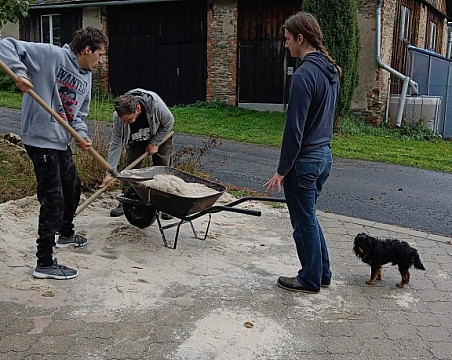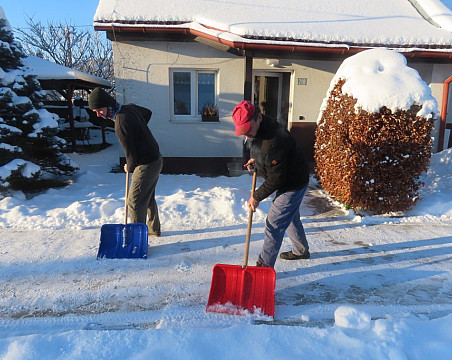
News
Jeremia's journey: "I haven't regretted coming here yet"
...Jeremia came from Austria and he's been volunteering in Archa Široká Niva. What's his experience about? Let's read his story...
"Where do I start... I've been in the Czech Republic for two and a half months now and it's been a lot. The culture as well as the nature of the country is too similar to my home country to be interesting from my point of view, so I'll focus on the actual volunteering part. First of all, I would like to talk about the biggest challenge, which is the language. Although I don't think Czech is as difficult as people think, it was very difficult and time-consuming to communicate in the beginning (and sometimes still is) because most people over forty don't speak English at all and most people over thirty don't speak it very well. Of course, this can also be seen as a positive thing, as learning the language is not only an added bonus, but a must in order to make the social year more comfortable. However, as far as I can tell, many Czechs are very accommodating when it comes to this barrier. I had this feeling in my workplace and with the people I met elsewhere (apart from a few bus drivers and shop assistants who got far too angry far too quickly because I didn't understand them).![]()
Unlike most of the volunteers in the InterVia programme, I live alone in a studio flat, which of course has its disadvantages (no one around, not much space) but also its advantages (more personal space and therefore more freedom). The first two weeks, before I knew there were other volunteers in my town, were a bit lonely though. My job is about an hour away by train, so I travel a lot. Some people might find this annoying, but as I am used to travelling by public transport🚌, I see it as a time to read, learn vocabulary and get some extra rest. The facility itself is located in a small, unassuming town and consists of three small houses where the clients - people with mental disabilities - live in shared flats, plus a large garden. I usually work from seven in the morning until one in the afternoon, although I have been told that I can sometimes work in the afternoon, too.
A day at Archa starts slowly. I help give the clients their medication and prepare a project or do other small tasks. All in all, I have two main tasks. One is to assist the caregivers and the other is to assist the clients. The emphasis is on assisting because we are supposed to teach the clients how to do things for themselves and not do everything for them. Of course, some people need more help than others, depending on their level of disability. Assisting can mean many things. A lot of the time it's cooking 👨🍳or cleaning, but things like going for walks or taking them to the doctor👨⚕️ are also part of the job. I also like to work in the garden🌳, partly because that's my actual occupation, but also because I like physical work. For a small daily fee, I can have a hot lunch at noon.
The team of caregivers and social workers are very welcoming. They try to teach me some Czech and include me in most activities. Sometimes, however, they seem a bit at a loss as to what to do with me when there isn't really anything to do. This is understandable as I am their first volunteer for a long time, as far as I have understood. I also see this as a challenge to work more independently and bring my own ideas into the mix, which is easier said than done, not because I wouldn't get the support I need, but because I feel it still has to fit into the placement, which is mainly there to help the clients with their daily lives, not to give them busy work. At the moment, for example, I'm planning a vegetable garden 🥕 to plant in the spring.
Since about half of the clients go to a day center, I tend to work with the same few clients every day. This also means that the people I work with have more severe mental disabilities, which can make communication more difficult, but also gives my presence more meaning. Some of them already actively seek me out when they need small things, which I really appreciate (even if I can't help them a lot of the time). Of course, working in this sector takes some getting used to. Responding to the different needs of the clients is an important responsibility, and although their needs are often not so different from those of healthy people, it takes some getting used to identifying them because they are communicated differently. The language barrier makes it even more difficult. I also know from previous experiences that, like everywhere else, there are people who take advantage of your ignorance to get something they wouldn't get from other people (anymore), so I'm still learning to distinguish between helping in a way I'm supposed to and just being used. On the other hand, many of them are really caring and make me feel included in this small community by talking, smiling and laughing with me.😀
All in all, the year abroad has been more challenging than I expected so far and I can get frustrated at times, especially when it comes to the communication difficulties that still exist. But I haven't regretted coming here yet. It was a bit of a leap of faith to put myself in this unknown situation, but I haven't fallen because I get all the help I need with any problems I might have." (Jeremia,Austria)





